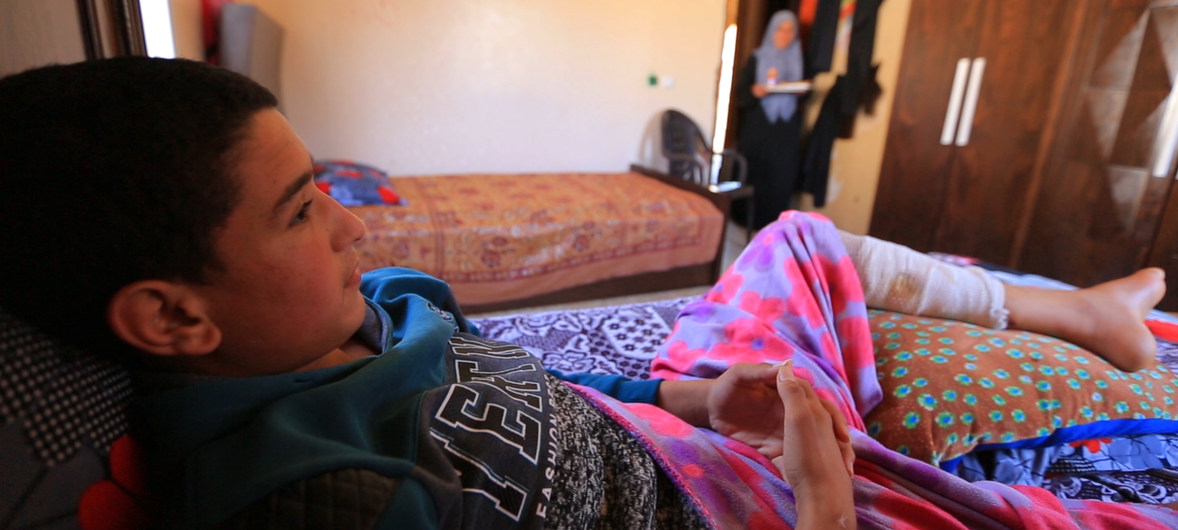
A 14-year-old boy who was reportedly shot and injured in both legs on 30 March in Gaza.
Medical teams inside Gaza are running out of supplies to cope with the wounded, following the deadliest day of protests against occupation along the border with Israel so far this year, UN aid agencies warned on Tuesday.
Speaking after 58 Palestinians lost their lives and more than 1,300 were injured by Israeli security forces on Monday, the World Health Organization’s Tarik Jasarevic said that life-saving drugs were “urgently needed”.
These include antibiotics and adrenaline, according to the WHO spokesperson, who explained that more than 10 years of blockade had already undermined Gaza’s healthcare capacity.
Two in every five essential drugs were “completely depleted” already this month, Mr Jasarevic explained, adding that essential life-saving medicines for chronic illnesses such as cancer were also “critically low”.
Jens Laerke from the Office for the Coordination of Humanitarian Affairs (OCHA) reiterated the difficulties faced by health teams in the enclave: “Medical facilities in Gaza are struggling to deal with the number of casualties and the humanitarian coordinator there, Jamie McGoldrick, has expressed his deep concern by the tragedy unfolding in Gaza after visiting the Shifa Hospital,” he said.
He added that Mr. McGoldrick – who is also UN Deputy Special Coordinator for the Middle East Peace Process – had reported that medical teams at Shifa, in Gaza City, “are overwhelmed, dealing with hundreds of cases of injured, including women and children.”
“They are stretched to the limit and running out of essential medical supplies. He stressed that public hospitals in Gaza have less than a week of fuel reserves to continue their operations”, Mr. Laerke told journalists in Geneva.
The situation has not been helped by the stop-start delivery of humanitarian supplies.
Official statements simply say this is all Hamas’s fault and…just ignore the fact that the children are being killed, women are being killed, unarmed protesters are being killed in large numbers – Rupert Colville (OHCHR)
These usually arrive via Gaza’s main supply point, Kerem Shalom, but it was closed after being damaged, although an aid convoy had been allowed in by Israelis in recent days, Mr Laerke said.
“It has been closed indefinitely following extensive damage to the Gaza side of this crossing by Palestinians on 11 May. However, Israeli authorities have indicated that this crossing will be opened for, ‘select humanitarian needs’ on a case-by-case basis and the day before yesterday they allowed seven trucks to enter Gaza and I understand that six of those trucks were carrying medical supplies.”
Following Monday’s developments in Gaza, the UN human rights office, OHCHR, called for Israel to mount an independent investigation into the deaths and injuries sustained along the border.
OHCHR spokesperson Rupert Colville told journalists in Geneva on Tuesday that six children and a health worker were among the dead and that more than 150 people were in a critical condition.
The rules on the use of force under international law “appear to have been ignored again and again”, Mr Colville said, adding that “it seems anyone is liable to be shot dead or injured: women, children, press personnel, first-responders, bystanders – and at almost any point, up to 700 metres from the fence”.
Ten journalists had also suffered gunshot injuries by the end of the day, Mr Colville said.
A reported 35,000 people took part in Monday’s demonstrations, according to OCHA.
During the protests some Palestinian demonstrators threw stones and Molotov cocktails at Israeli soldiers, according to OHCHR’s Mr Colville, who added that others had flown kites laden with “petrol-soaked material” over the fence that separates the two communities.
The response from the Israeli side – with tear gas, plastic bullets and live ammunition – had caused “horrific wounds and lifelong disability”, Mr Colville said, before calling for “credible investigations” by Israel.
“Latterly we only seem to be seeing investigations carried out when there’s a very clear bit of video evidence becoming public through witnesses and bystanders,” he said. “And the official statements simply say this is all Hamas’s fault and…just ignore the fact that the children are being killed, women are being killed, unarmed protesters are being killed in large numbers.”
So I think with the State of Israel it’s very important for credible investigations into these very serious, very serious events and very possibly, very serious crimes as well.”
Confirming that Israel had a right to defend its borders, the OHCHR spokesperson said that its soldiers should do so in accordance with international norms on the use of lethal force.
“You just have to look at the casualty figures on both sides to see that it’s not being used as a last resort,” he said, adding that Israel was obliged “under international law, to handle these demonstrations in a way that preserves life, unless they own lives are very clearly directly threatened, which has not been the case.”
UN human rights experts also condemned the killings and Israel’s use of live ammunition against mostly-unarmed protesters.
“Despite Israel’s commitment to investigate the events of the past few weeks, security forces continue to use live ammunition and rubber bullets against the protesters, killing and wounding dozens of mostly unarmed protesters, women, men and children alike,” said a group of six Special Rapporteurs, in a joint statement.
“We express our outrage over these shootings that may have resulted in unlawful killings and the incomprehensibly high number of injuries sustained,” the statement added.